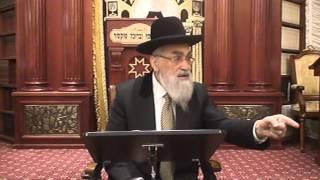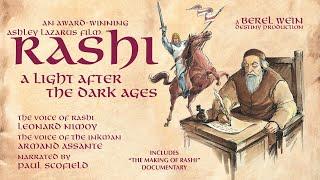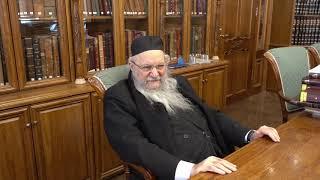Problems playing the video? Click Here to reload
Watch Videos: Random | New | Popular
All Essays | Report Video
|
Share Video
- Buy Us a Coffee -
Rabbi Mendel Kessin
Hashem offers us a consolation deeper than the assurance that we will be redeemed.
Contact us at torahthinking.com/contact
Synopsis is not necesarrily in Rabbi Kessin's own words
The Jews ask why
-----------------------------
- At the end of time the Jews will ask Hashem why they had to go through the tremendous suffering, persecutions and desolation of galus.
- Hashem sent others to console them, but Only Hashem Himself will be able.
- What does Hashem do that the others couldn’t?
- Why does Hashem use a repetitive language?
- Why is Hashem's Name of Justice used instead of His Name of Mercy?
2 points of view on Roman Majesty
-------------------------------------------------------------------------------------------------
- 4 tannaim were walking through Roman society. They wittnessed the success and majesty of Roman society.
- 3 of them started crying
- Rabbi Akiva laughed
- The others asked why he was laughing
- He asked tham why they were crying
- They answered that the Romans are sitting at peace and our temple is burned. Why shouldn’t we cry?
- He answered that's why I'm laughing. If this is how Hashem behaves toward those who defy him, how much more so for those who serve him.
2 points of view on the desolation
-------------------------------------------------------------------------------------------------------
- These 4 tannaim were then waking on the mountain that overlooks the Har Habayis
- They all rent their garments in mourning
- When they came near the place where the Kodesh Kodoshim was, they saw a fox leave that place.
- 3 of them started crying
- Rabbi Akiva laughed
- The others asked why he was laughing
- He asked tham why they were crying
- They said that when the Bais Hamildosh stood, if someone entered the Kodesh Kodoshim when he was unworthy or unauthorized, he would die immediately. Yet now a fox can go there and remain unharmed.
- Rabbi Akiva responded that that was precisely why he was laughing.
- Rabbi Akiva then referred to verses in the Navi that imply that the nevuah of redemption is dependant on the nevuah of destruction.
- The others replied: Akiva you have consoled us. Akiva you have consoled us.
- Why did we need to know the type of animal it was?
- Why did Rabbi Akiva ask why they’re crying? Isn’t it obvious?
- If now was a time of destruction, shouldnt Rabbi Akiva have been mourning despite his confidence in the redemption?
- How is the redemption is dependant on the destruction?
- The other tannaim knew that there would ebe a redemption. What new point of view did Rabbi Akiva tell them that consoled them?
- Why did they answer with a repetitive phrasing?
Tough love
-----------------
- A father once had a son to whom he gave everything
- The son, was ungrateful
- The father threw his son out of the house.
- Eventually the son realized the good his father gave him and missed it and his father and started to mourn.
- This was the very thing the father was waiting for.
The mourning and suffering is the solution
--------------------------------------------------------------------
- The suffering of galus rectifies the issues that caused the galus in the first place
- The mourning shows we want to be close to Hashem - it is the tikun for what we did to cause the destruction.
The stories explained
----------------------------------
- When the tannaim got to Har Hatzofim, they all rent their garments - even Rabbi Akiva.
- The fox was specified because it is a sly animal. This was a sign to Rabbi Akiva that there was a message here that was not readily apparent.
- When Rabbi Akiva asked the others why they were crying, he was prompting them to offer the idea that he would use to show his point that the destruction and mourning was the key to the redemption
- The redemption is dependant on the destruction since the destruction was necessary as a mesaken to bring the redemption.
- The consolation that Hashem gave that no one else could was Him showing how throughout history, both nationally and personally, all the pain and suffering was the key in being mesaken what we didn’t so we could experience the bliss of Olam Haba. All the others who offered consolation only showed how the suffering will eventually end with the redemption - not why the suffering happened.
- The name Elokim is used to show how when all is said and done - the redemption will be just because of the suffering and not an act of kindness alone
- That’s the repetitive language of consolation:
- Nachamu that the suffering will end and the redemption will come
- Nachamu that the suffering itself had the purpose of being the cause and key of the redemption
The future celebration of Tisha B’Av
---------------------------------------------------------
- Mashiach will be born on Tisha B’Av.
- After the redemption, Tisha B’Av will be the greatest of the holidays
- Anyone who mourns the destruction properly will merit (present tense) seeing its rebuilding.
in english
Hashem offers us a consolation deeper than the assurance that we will be redeemed.
Contact us at torahthinking.com/contact
Synopsis is not necesarrily in Rabbi Kessin's own words
The Jews ask why
-----------------------------
- At the end of time the Jews will ask Hashem why they had to go through the tremendous suffering, persecutions and desolation of galus.
- Hashem sent others to console them, but Only Hashem Himself will be able.
- What does Hashem do that the others couldn’t?
- Why does Hashem use a repetitive language?
- Why is Hashem's Name of Justice used instead of His Name of Mercy?
2 points of view on Roman Majesty
-------------------------------------------------------------------------------------------------
- 4 tannaim were walking through Roman society. They wittnessed the success and majesty of Roman society.
- 3 of them started crying
- Rabbi Akiva laughed
- The others asked why he was laughing
- He asked tham why they were crying
- They answered that the Romans are sitting at peace and our temple is burned. Why shouldn’t we cry?
- He answered that's why I'm laughing. If this is how Hashem behaves toward those who defy him, how much more so for those who serve him.
2 points of view on the desolation
-------------------------------------------------------------------------------------------------------
- These 4 tannaim were then waking on the mountain that overlooks the Har Habayis
- They all rent their garments in mourning
- When they came near the place where the Kodesh Kodoshim was, they saw a fox leave that place.
- 3 of them started crying
- Rabbi Akiva laughed
- The others asked why he was laughing
- He asked tham why they were crying
- They said that when the Bais Hamildosh stood, if someone entered the Kodesh Kodoshim when he was unworthy or unauthorized, he would die immediately. Yet now a fox can go there and remain unharmed.
- Rabbi Akiva responded that that was precisely why he was laughing.
- Rabbi Akiva then referred to verses in the Navi that imply that the nevuah of redemption is dependant on the nevuah of destruction.
- The others replied: Akiva you have consoled us. Akiva you have consoled us.
- Why did we need to know the type of animal it was?
- Why did Rabbi Akiva ask why they’re crying? Isn’t it obvious?
- If now was a time of destruction, shouldnt Rabbi Akiva have been mourning despite his confidence in the redemption?
- How is the redemption is dependant on the destruction?
- The other tannaim knew that there would ebe a redemption. What new point of view did Rabbi Akiva tell them that consoled them?
- Why did they answer with a repetitive phrasing?
Tough love
-----------------
- A father once had a son to whom he gave everything
- The son, was ungrateful
- The father threw his son out of the house.
- Eventually the son realized the good his father gave him and missed it and his father and started to mourn.
- This was the very thing the father was waiting for.
The mourning and suffering is the solution
--------------------------------------------------------------------
- The suffering of galus rectifies the issues that caused the galus in the first place
- The mourning shows we want to be close to Hashem - it is the tikun for what we did to cause the destruction.
The stories explained
----------------------------------
- When the tannaim got to Har Hatzofim, they all rent their garments - even Rabbi Akiva.
- The fox was specified because it is a sly animal. This was a sign to Rabbi Akiva that there was a message here that was not readily apparent.
- When Rabbi Akiva asked the others why they were crying, he was prompting them to offer the idea that he would use to show his point that the destruction and mourning was the key to the redemption
- The redemption is dependant on the destruction since the destruction was necessary as a mesaken to bring the redemption.
- The consolation that Hashem gave that no one else could was Him showing how throughout history, both nationally and personally, all the pain and suffering was the key in being mesaken what we didn’t so we could experience the bliss of Olam Haba. All the others who offered consolation only showed how the suffering will eventually end with the redemption - not why the suffering happened.
- The name Elokim is used to show how when all is said and done - the redemption will be just because of the suffering and not an act of kindness alone
- That’s the repetitive language of consolation:
- Nachamu that the suffering will end and the redemption will come
- Nachamu that the suffering itself had the purpose of being the cause and key of the redemption
The future celebration of Tisha B’Av
---------------------------------------------------------
- Mashiach will be born on Tisha B’Av.
- After the redemption, Tisha B’Av will be the greatest of the holidays
- Anyone who mourns the destruction properly will merit (present tense) seeing its rebuilding.
in english
- Category
- Devarim-Vaetchanan
- Tags
- Shabbos Nachamu
Commenting disabled.
















